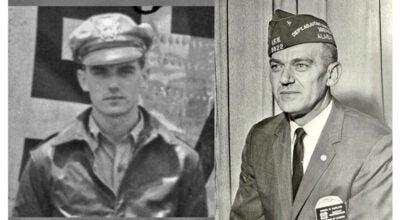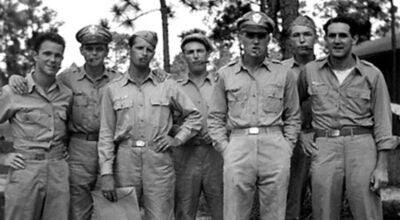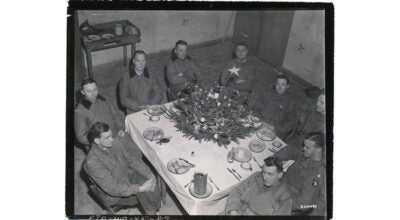Rudolph Farmer, Sergeant First Class, U.S. Army, Korea Killed in Action
Published 1:00 pm Friday, September 22, 2023
|
Getting your Trinity Audio player ready...
|
Sergeant Rudolph Farmer didn’t have to man the forward observation post in Korea the night of September 22, 1952. His platoon leader, 2nd Lt. Donald Hinson, had ordered a squad of seven troops to man an observation post some distance from where the company had set up a defensive position. He suspected that the enemy might attack during the night and he wanted someone out in front of their main line of defense that might provide an early warning.
SFC. Farmer asked to lead the squad because of the inexperience of the squad leader. Sometime during the night, an entire company of Chinese Communist troops attacked the seven-man squad manning the outpost. The gallant squad held the enemy off until the brink of dawn when the American forces finally broke through to rescue them.
One of the men in the squad came forward with a tale of heroism. SGT. Erwin Elsworth stated that he was next to SFC. Farmer when a Chinese grenade landed. Farmer threw himself upon the grenade, taking the full impact and saving the lives of the others in the squad.
Lt. Hinson said the following in a telegram to Farmer’s mother, “There is no other act of bravery in my opinion that could surpass this. His sacrifice was not in vain, however. For brave men such as he, are those who make our country a better place in which to live. We wish to extend our deepest sympathy and may God bless you and the rest of your family.”
Rudolph “Buddie” Farmer was born February 3, 1929, in Kinston, Coffee County, Alabama. His parents were Ralphord Roy and Minnie Donaldson Farmer. The family moved to a farm near the Liberty Hill community in Covington County, Alabama, where Buddie attended Lockhart School. His parents were sharecroppers and Buddie worked on the farm. After completing the seventh grade, Buddie left school and went to work on his Donaldson uncle’s farm in northwest Florida. He still lived with his family in Covington County but was often gone for weeks.
At 17 years of age, Buddie decided to join the Army. He got his mother to sign for him since he was not 18. He completed basic training at Fort McClellan, Alabama, and was sent to Fort Benning, Georgia, where he completed Airborne School. During a practice jump, Buddie noticed a fellow paratrooper whose parachute had not opened. Since they were still in free-fall, Buddie managed to make his way to the other soldier and hooked onto his harness, allowing both of them to make a hard landing. The story was written about in a local newspaper.
Buddie was deployed to Germany after Jump School, sometime in late 1946. He served as a Light Weapons Infantry Leader in Company B, 18th Infantry Regiment, 1st Infantry Division. He was considered part of the Allied Occupation Army. Buddie’s initial enlistment was up in 1950, so he re-enlisted in April of that year. While he was in Germany, Buddie met and married Edith Mueller. They would have two children by the time Buddie returned to the States. In late 1951, Buddie received notice that he was being sent to Korea. He returned to the States for a visit in late 1951 before being deployed to Korea in early 1952.
Upon arrival in Korea, Buddie was assigned to Company G, 7th Infantry Regiment, 3rd Infantry Division. His platoon commander was 2nd Lt. Donald L. Hinson.
There is little information about Buddie’s Korean experiences prior to his death on September 22, 1952. Buddie’s mother received a letter from him written on September 21, the night before his death. In one of the ironies of war, Buddie’s letter arrived after his death.
Buddie’s letter read in part, “Well, I don’t have to worry about going to heaven now because I got the hell scared out of me this afternoon. I was walking alone on the rear slope of a hill and I heard a mortar round coming in so I just dove into a hole. It landed about 10 ft. from me and almost knocked me out of the hole. I still can’t hear good but my ear drums aren’t hurt. I had a Doc look at them and he said I’d be OK by tomorrow. So, it isn’t bad, just scared me half to death that’s all.”
He continued, “I have met a lot of good men over here. Most of the good guys are going home the first of the month. So, it leaves me with almost all new men but most of them are darn good soldiers. I have a damn good platoon….The First Sergeant is going home the 15th of next month and the Captain said today that he wanted me to be First Sergeant so I guess I will. I will make another stripe and this winter when most of the guys are freezing, I will be in a nice warm command post.”
Buddie Farmer would never receive that stripe. His heroic action on the night of September 22. 1952, saved the lives of his squad, but cost him his own. He was awarded the WW II Occupation Medal [Germany], the Combat Infantryman Badge, the Korean Service Medal, the Purple Heart, the National Defense Service Medal, the Republic of Korea Presidential Unit Citation, the Republic of Korea Service Medal and the United Nations Service Medal.
SFC. Rudolph “Buddie” Farmer’s funeral was held December 1, 1952, at the Rhodes School House in Coffee County, Alabama. Burial was in Rhodes Cemetery with full military honors. Farmer was survived by his wife, Edith Mueller Farmer, a daughter, Edith and son Rudi, who were still in Germany. He was also survived by his parents, Roy and Minnie Farmer; four brothers, Edward, Donald Ray, David and Rex Farmer; five sisters, Helen, Jean, Mary Jane, Barbara Ann and Evelyn Marie Farmer.John Vick
Author’s note: Through the years, there heave been several attempts to have SFC Rudolf Farmer awarded the Medal of Honor. Thus far, none were successful. Having read the letter written by his commanding officer, 2nd Lt. Donald L. Hinson, it is difficult to understand why Farmer never received any recognition, much less the Medal of Honor.
The author thanks SFC Farmer’s sister, Helen Farmer Reynolds of Opp, Alabama, and her son Steve Reynolds, for helping write this hero’s story.
More COLUMN -- FEATURE SPOT



![Photo of Sgt. Rudolph “Buddie” Farmer and his wife, Edith, taken in Germany. [Photo: Helen Reynolds]](https://www.andalusiastarnews.com/wp-content/uploads/sites/13/2023/09/John-Vick-9-22-2023-main-web.jpg)
![Photo of Sgt. Rudolph “Buddie” Farmer with fellow non-commissioned officers. Farmer is second from right. [Photo: Helen Reynolds]](https://www.andalusiastarnews.com/wp-content/uploads/sites/13/2023/09/John-Vick-9-22-2023-web-2.jpg)


